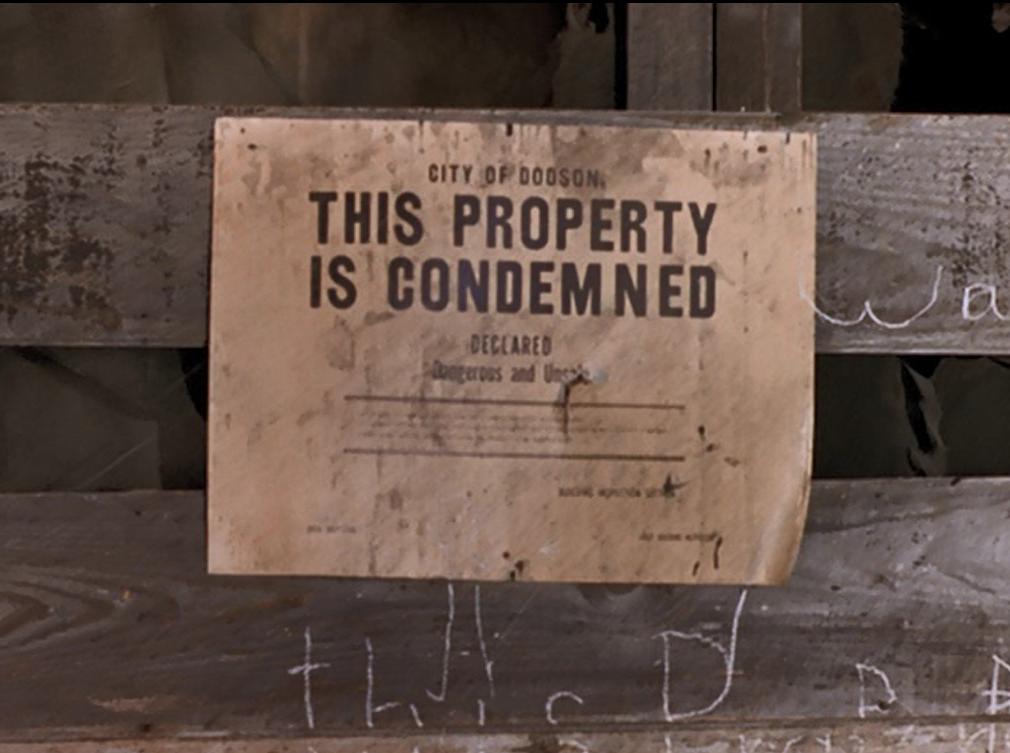
Faith on Film is a monthly feature published the last Sunday every month.
Though This Property Is Condemned is an often overlooked footnote in the highly successful careers of its cast and crew, it deserves appreciation not merely for its artistic merit, but its power to absorb and outrage.
Today, though there are differences between our world and the reality presented by the film, its story has unique parallels with how our faith is understood and managed by the institutional church and other people.
Here is the film trailer:
Review
Many films possess the power to shock and horrify. Of course, most of these are genre outings featuring over-the-top special effects intended to enhance scenarios and premises that fail to suspend disbelief. Movies that inspire the same emotion through the strength of their performances and the tangibility of the subject matter are hard to come by, and nearly extinct these days.
Although when This Property Is Condemned was released in 1966 it was not a critical nor box office success, almost sixty years later it remains a powerful and effective film.
It’s a film that’s easy to misjudge: written by Francis Ford Coppola (my favorite living film artist) from a play by Tennessee Williams, directed by the underrated Sidney Pollack, and starring Natalie Wood and Robert Redford when both were in their prime, one could glance at its pedigree and assume it to be an undiscovered classic. On the other hand, a sterile recitation of the basic plot makes it sound like yet another deep southern-fried tale of tribulation dripping from the pen of Tennessee Williams, set in the Great Depression with a stoic leading man and a smoldering debutante as star-crossed lovers that were never meant to be.

In spite of all of these factors, This Property is Condemned is ultimately satisfying in its own right. One hot summer night in 1931, Owen Legate (Robert Redford) arrives mysteriously by train in the small town of Dodson, Mississippi, where the railroad is the prime source of economy. This is especially true for the ramshackle Starr boarding house, which happens to be located less than a hundred yards from the tracks. Needing a place to stay, Owen, a cultured, prepossessing man of sharp intelligence from New Orleans, approaches the distressed Victorian boarding house to find young tween Willie (Mary Badham, popularly remembered as Scout from To Kill a Mockingbird) knocking on the windows of parked cars trying to find her Mama, providing all the insight we need into the circumstances of the Starr family.
Owen eventually locates Willie’s Mama (Kate Reid) who accepts his request to live in her home by shrugging her shoulders and remarking, “a buck is a buck.” Mama is the apparent ringleader of a circus: every light in the house is on, a live band is playing, and dozens of hard-working railroad men are drinking and carousing wildly.
Apparently the raucous, party atmosphere of the boarding house is commonplace, only this is Willie’s older sister Alva’s (Natalie Wood) birthday, or as Willie calls her “the main attraction.” All of the men (including future superstars Robert Blake and Charles Bronson) are enamored with Alva, who commands attention as she enters the room. Though outwardly glamorous and charismatic, Alva is also transparently ambitious. Her hopes and dreams lie far beyond the squalor of the boarding house and cozening railroad men offering cold hard cash to her Mama to stay under the same roof.

Certainly, Alva understands that her mother is sexually exploiting her, but she lives in a fantasy world where her father will someday return, where she is desired for her charm and not just her body, and one day a handsome man who loves her will sweep her off her feet and carry her to a life of luxury in a thriving metropolis.
When Owen and Alva first meet, she is instantly captivated, and he sees through her lies and fantasies as if she is made of glass. Of course, this does not mean that he feels no attraction; to the contrary, the first night at the boarding house, he asks her if she comes with the room, and the next day he tells Willie he suspects Alva is “a mighty potent force.”
In spite of this, Owen is quick to defend Alva’s honor, even when she is not around. During the first act, we are unsure whether he is the lone protector of Alva’s innocence or if he is merely attempting to save her so he may have her for himself, and there may not be a single answer.

Twice in the early moments of the film, we are treated to scenes that may reveal what is going on inside the minds and hearts of the characters for just a split second. As the lights are lowered and Alva is presented with a birthday cake, the camera focuses directly upon her eyes. For just an instant, you almost wonder what wishes could be coursing through Alva’s mind, and in the candlelight, you can almost see the person beneath the arch flirtations and heavy makeup. Almost.
Later, Alva sees a falling star and asks Owen to make a wish. The camera sweeps around him and we see deep into his eyes as well, but there is no mystery in his gaze as he looks upon Alva.
Owen works for the railroad too, only in a special capacity. Because of the depression, jobs are being cut, and he came to town specifically to accomplish this task singlehandedly. As Owen walks into the railroad office through the shop, one-by-one the workers pause and stop when he passes by adjusting his necktie and buttoning his jacket. They know what is coming; his arrival means not just the end of work for them, but the end for the Starr boarding house where they live, and even the end for virtually the entire town.

For her part, Mama had already planned for this day. She has her sights set on a comparatively wealthy but elderly man named Johnson, who is greatly interested in Alva despite his wife’s poor health. Mr. Johnson wants Alva on his own terms, and thinks that buying gold bracelets from Marshall Fields should earn him her undivided adoration. He even offers her a house in Memphis plus an allowance. Of course, Mama and Willie would be coming along too.
Despite Alva’s delusional view of her circumstances and Owen’s cold pragmatism, they find one another as the pink slips are handed out, and the plot of the film twists and turns in ways that pull all the narrative threads together into an ending that feels both unexpected and yet inevitable.
This Property Is Condemned is a flawed masterpiece about flawed people. The characters grapple with their own demons, haunted by past traumas and unfulfilled dreams.
Framed by the recollections of an older Willie five years later as she walks down the railroad tracks retelling Alva’s saga to a boy (John Provost, known for his role as “Timmy” on Lassie) skipping school to fly a kite, the film never shies away from the ugliness of humanity, and their contentment to accept ugliness in their lives.

Alva, despite declaring to her Mama, “just because I’m beautiful doesn’t make me everyone’s property,” is too happy to think of filth and dust as lilac talcum, and sees beautiful reflections in water of the Jackson Square fountain in New Orleans rather than the foul, swampy algae carpeting it’s bottom.
Like Alva, though Willie dresses up in her best clothes and fills her heart and head with hope, she has no idea how transparent her circumstances actually are, and is completely oblivious to how much she has to lose.
Meanwhile, person after person asks Owen throughout the film if he likes his job or how he sleeps at night, and finally he responds, “I can’t make myself feel bad.”
Yet, it is precisely flaws such as these that make the characters and their journey so compelling. Through their struggles and shortcomings, they find moments of grace and redemption, revealing the depth of the human spirit in the face of adversity. The film’s imperfections mirror those of its characters, serving as a reminder of the messy, unpredictable nature of life itself.
In the end, This Property is Condemned is not just a story about flawed people; it is a testament to the enduring power of hope, resilience, and the imperfect beauty of the human experience.
Reel Theology
This Property Is Condemned holds wisdom those of us with faith can learn from.
Today, many churches no longer function as indigenous communities who share their lives with one another and their neighbors as they make Christlike disciples. Instead, churches hold not only scheduled services but events, and the facilities where these take place are even referred to as the house of God, as if he actually resides within physical structures of brick, stone, and wood.
Church leaders and sometimes even clergy are drawn into this. Instead of demonstrating disciplemaking, preaching has become the chief expectation many have of a pastor. I have seen many wonderful people who responded to God’s call by dedicating their lives slowly transform over the years into performers who seek to entertain as much as inspire and teach.

As attractional models continue to flourish and authentic relationships are relegated to “ministries” run by committee, the church looks less like the examples depicted in the New Testament and more like the Starr boarding house.
Like many churches, the Starr boarding house was filled with people gathered together for a singular main attraction. And like too many church leaders, Mama was the ringleader of the circus, providing whatever was needed to attract paying customers her way.
And in the film, Alva was the ultimate attraction, someone exploited openly for profit. Likewise, how many institutional churches and their leaders exploit Jesus to gain people and ultimately their tithes and offerings?
Some advertise special Easter or Christmas services, or offer free concerts. All are centered around Jesus, and at none are offerings not encouraged. Some events even require participants to pay.
Of course, many of you are angered at my words by now, and certainly there are clergy and congregations who simply love Jesus and one another. But I have seen too many people, even pastors, remark in the words of Alva’s Mama, “You wouldn’t want Mr. Johnson to get dissatisfied, would you?”
In the film, Mama hitched her wagon to the elderly Mr. Johnson’s fortunes, and she was dragging Alva along for the ride whether Alva wanted to or not. At one point, Mama actually got on her knees and pleaded with Alva, prayerfully begging her to just keep Mr. Johnson happy for a few weeks.

How many times have I seen desperate church leaders pleading for God to keep the doors of a financially distressed church open, begging for people to stay so salaries can be paid along with utilities and mortgages.
Meanwhile, the real purpose of Jesus gets lost, the same way no one considered what would be best for Alva, let alone her own agency as a living flesh and blood person. She was used by others for different reasons, and none of them were hers.
And in the end, these grand campuses and facilities dedicated to institutional faith profiteering will one day become not unlike the first and last image we see of the Starr boarding house: a derelict shell of a building, condemned dangerous and unsafe.
Poor Willie. She wears Alva’s old torn clothes and tells her story, even living in her old house. And no matter how much Willie tries to look or sound like Alva, no matter how much Willie devotes herself to Alva, Willie will never be like Alva in life or even in death. As the credits roll, Willie’s all alone, and even the boy she poured out her heart to goes his own way, not fully convinced.
Poor us.
★★★☆☆















